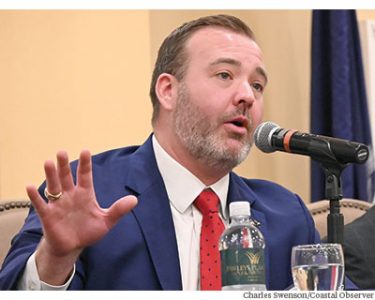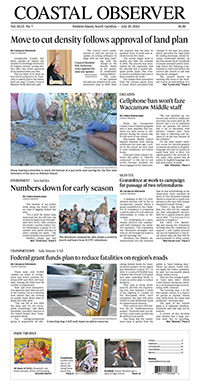Environment
State asserts public right to North Inlet marshes

Even if the Belle W. Baruch Foundation holds title to the marsh land surrounding Hobcaw Barony, the public’s long-time recreational use of the area has created a prescriptive easement over the property, according to the state’s top attorneys.
S.C. Attorney General Alan Wilson and Solicitor General Robert Cook want an order declaring that the property, including North Inlet, is dedicated to public use, according to documents filed last week in Circuit Court.
The Baruch Foundation filed suit against the state in November seeking to confirm its ownership of the land between the mean high water mark and the mean low water “that is contiguous to the high land it owns.” The marsh land comprises about half of the 16,000 acres at Hobcaw Barony.
The property was originally part of six grants from the kings of England in the early 18th century. It was eventually bought by Bernard Baruch in the early 20th century. He sold it to his daughter, who created the foundation to manage the land for research by the state’s colleges and universities.
The state also claims ownership.
“It has prima facie fee simple title, in public trust, of all lands now or formerly lying below the mean high water mark of all lands now or formerly lying below the mean high water mark of all tidal navigable waters in the state, including, but not limited to the Atlantic Ocean … unless those lands at issue in this case were granted by a sovereign grant and deeded to plaintiff under South Carolina law,” according to the response from the state.
The state’s response also says the foundation “lacks the power to exclude the general public from the waters, because the public has a right under the Constitution and statutes of South Carolina to make use of navigable waters.”
Along with challenging the Baruch Foundation’s claim, the state seeks a ruling that the marsh land is public through “continued use of the property for fishing, shrimping, crabbing and similar activities over the course of many years,” according to the court filings.
George Chastain, the executive director of the Baruch Foundation, said in November that they consulted with the attorney general’s office before filing the suit. The foundation doesn’t claim ownership of navigable waters and the suit won’t alter the use of North Inlet for recreation, he said.
“Our position hasn’t changed,” he said last week.
But state Sen. Stephen Goldfinch said the lawsuit would allow the Baruch Foundation to restrict the use of North Inlet. He urged the state to oppose the foundation’s claim.
The suit would affect the area between Hobcaw Barony and North Island, which is on the southern tip of Waccamaw Neck, Goldfinch said. “That means that all the tens of thousand of people who use North Inlet every year will be subject to Hobcaw’s domain and whether or not they want to let people in and out of North Inlet. To me that’s a major concern,” he told business and community leaders gathered for a Chamber of Commerce legislative breakfast last week.
It is also a concern to the property owners at DeBordieu, the residential development on Hobcaw’s northern boundary.
“The public has been using the North Inlet marsh for generations. It is a cherished state asset, and we appreciate the Attorney General’s strong stance in defending public access rights against a private takeover attempt,” said Blanche Brown, manager of the DeBordieu Colony Community Association. “We also appreciate the efforts of state Sen. Stephen Goldfinch to protect public access.”
Goldfinch said he asked the Baruch trustees to grant the public an easement for recreational use, but they replied that the terms of Belle Baruch’s will, which created the foundation, would not allow that.
“Yes, they may have a king’s grant. Yes, they may not have enforced that king’s grant in the last 50 years. We have been using for 50-plus, really from the beginning of time if you think about it,” Goldfinch said. “I just find that to be unacceptable, and I find that to be a shame. I think the public waterways are for public use.”
State Sen. Ronnie Sabb, who represents the western part of the county, agreed that there needs to be a written guarantee.
“You can’t bind future generations with a handshake,” Sabb said.




